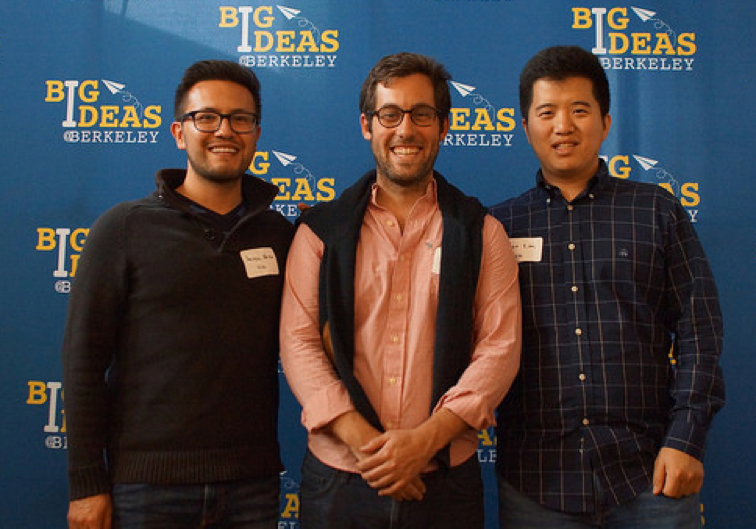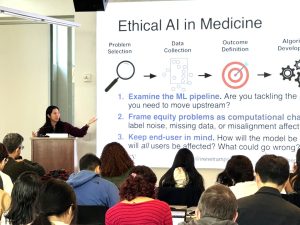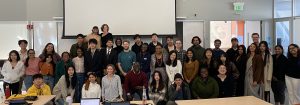By Veena Narashiman ’20
 Basic surgeries are far from basic. They require approximately 50 tools, which take about 2 minutes each for an experienced technician to clean. Operations in a trauma unit require as many as 400 tools. And in both environments, surgical tools can be easily misplaced, thrown away, or misassembled. In fact in the U.S. alone, busy surgical teams inadvertently leave an instrument inside a patient about 1,500 times a year.
Basic surgeries are far from basic. They require approximately 50 tools, which take about 2 minutes each for an experienced technician to clean. Operations in a trauma unit require as many as 400 tools. And in both environments, surgical tools can be easily misplaced, thrown away, or misassembled. In fact in the U.S. alone, busy surgical teams inadvertently leave an instrument inside a patient about 1,500 times a year.
Solving the problem of surgical tool tracking is the focus of VIDI, a startup launched in November 2017 by Federico Alvarez del Blanco (’18 UC Berkeley MBA), John Kim (PhD ’18 UC Berkeley/UCSF Bioengineering), Hector Neira, (PhD ’18 UC Berkeley/UCSF Bioengineering), and Robert Kim (PhD candidate, UCSD MD/PhD, Neuroscience)—which received a Big Ideas 2nd place award in May in the Hardware for Good category.
The group of Cal students were inspired by a campus workshop on visual recognition sponsored by information technology company NEC. They began to realize that the same machine learning technologies being deployed for self-driving cars could be used to increase hospital efficiency by tracking the flow of sterilization tools used in operations and thus minimizing medical errors.
VIDI (which means “see” in Latin) is being developed to do the following: As technicians prepare instruments before a procedure, a camera facing the surgical tray tracks where each tool goes and ensures the number of tools present in the beginning remains constant throughout the process. When a tool goes missing, the technology alerts technicians of a possible error.
Neria, Kim, del Blanco, and Kim initially decided to target hospitals’ Central Processing Departments, where most tools are sterilized, since this area is more accessible than operating rooms. “We figured it was a good place to start. The less high stakes for a prototype, the better,” said John Kim. The team also realized sterilization operators are vastly underappreciated and underpaid, even though they are expected to enable fast turnover of surgical tools. “These technicians don’t stay in the same hospitals for a long time, because they burn out quickly. Also, every hospital has a different technique and different name for their procedures. It’s super easy to get confused and make a mistake as an operator,” added Kim.
Yet the focus on the Central Processing Departments did not yield enough information about tool loss. So the VIDI team members turned their attention to the surgical room. By placing a table top camera facing the surgical tray (filled with cleaned instruments), VIDI was able to automatically catalog the tools, a feature that cuts the operator’s time by half.
To further their idea, Hector Neria, John Kim, and Robert Kim participated in the National Science Foundation I-Corps, and conducted upwards of 100 interviews to understand the state of the medical field. From there, they entered the Haas NEC Innovative Solutions Fair, where they partnered with MBA student Federico Alvarez del Blanco, and subsequently won first place. Throughout the process, they explored new markets.
Said John Kim: “Our initial motivation was to tackle the issue of surgical tools being left in patients [a term called RSI], but that only accounts for 5 percent of all misuses… It’s not a huge market. We discovered that tracking the instruments was not well managed, and hospitals were having a hard time converting to new tools.”
At this stage, they were ready for Big Ideas ideation and mentorship. “Previous competitions were mainly focused on customer discovery,” said Kim. “We needed Big Ideas to receive feedback on our value proposition, and this feedback helped us understand more about our competitors and where they lie in the market.”
With the help of their Big Ideas mentor, product development specialist Bayan M. Qandil, they began to frame their business proposal. “One of our biggest hurdles was determining hospital workflow, and where VIDI fits in [it],” said Kim. “Big Ideas allowed us to experience the hospital atmosphere more intimately, so we could understand of how the day-to-day works. Their feedback was invaluable.”
One of their main takeaways and pivot points began with the realization that unlike other companies, VIDI users wouldn’t be the ones buying the product. In fact, the financial decision makers—hospital administrators—would never touch VIDI, yet they were still the people the team has to convince. “It’s a tricky situation to be in, but ultimately a good challenge,” said Kim. “Interviewing technicians from UCSF and the CEO of John Muir’s Medical Center helped us understand the balance of things. Hospitals realize the gravity of surgical mistakes and want to eliminate them. ”
VIDI now has the capability to detect 50 surgical instruments in a hospital setting. In September, they were chosen as finalists in the 2018 Collegiate Inventors Competition, which rewards innovation and research conducted by college students and their faculty advisers. They’ll be traveling to Virginia in November for the final round, in the hope to receive funding to advance their project.
The VIDI team, which chose its name from Julius Caesar’s saying veni vidi vici, is not shy about its excitement for the future. Said Kim, “The healthcare system desperately needs improvement— and our team wants to get our hands dirty as soon as possible to help hospitals with these unforced errors.”





